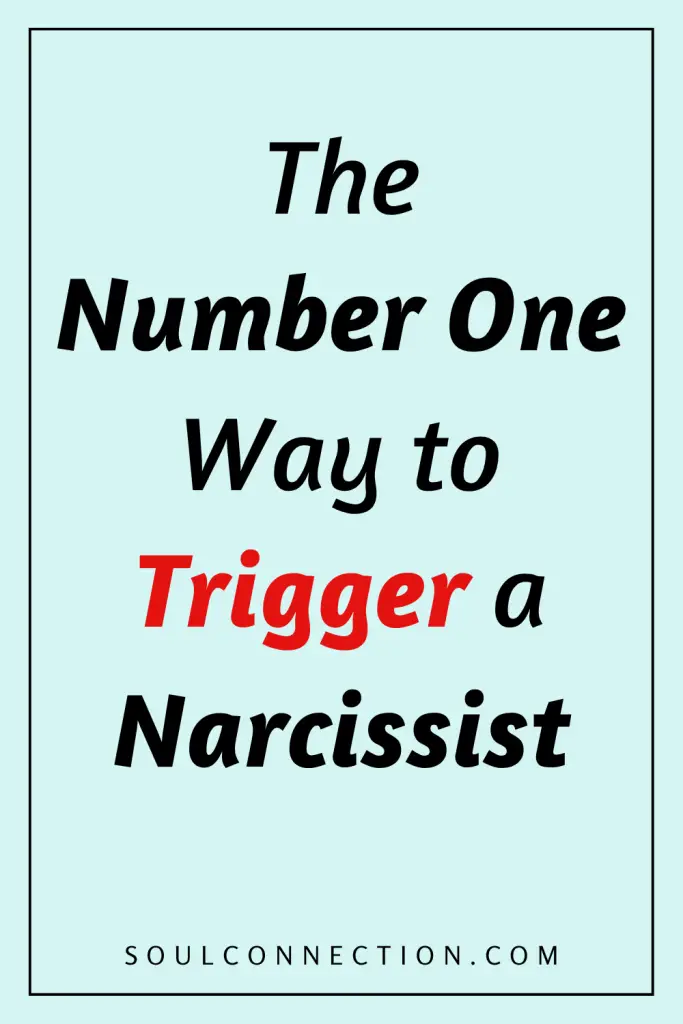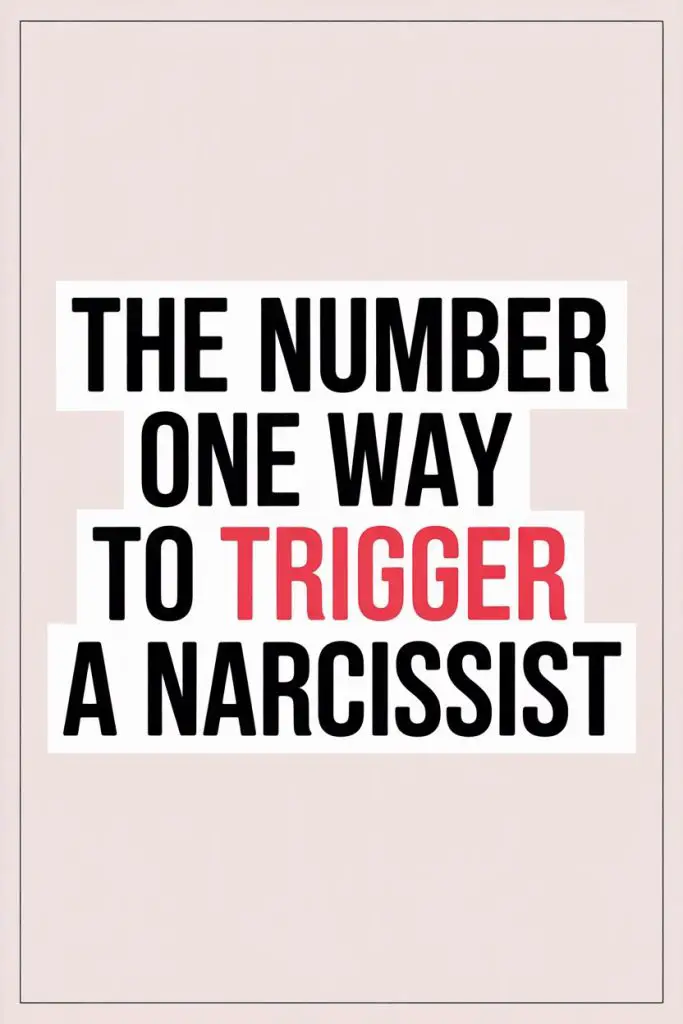Narcissists are famous for their thin skin and their uncanny ability to turn even the mildest slight into a federal case.
If you’ve ever found yourself walking on eggshells around someone who can turn a compliment into an insult and a neutral comment into a world war, chances are you’ve brushed up against someone with narcissistic tendencies.
But what truly sends a narcissist into a tailspin? The answer is both simple and, if we’re being honest, a little bit delicious.
The Narcissist’s Achilles Heel
Every narcissist—whether garden variety or the full-blown grandiose type—craves admiration like plants crave sunlight. Their entire personality is built on the need for validation.
They want to be the brightest star, the cleverest wit, and the Most Important Person in every room.
What happens when you don’t feed that need? Here’s the spark for their internal bonfire: Ignore them.
Not in the “pretend-they-don’t-exist” way you might reserve for a dodgy ex at a pub. What really gets under their skin is emotional indifference.
Withholding the attention, praise, or emotional response they expect is like cutting off the Wi-Fi in a teenager’s bedroom.
Why Indifference Stings More Than Criticism
A narcissist expects criticism—after all, everyone else is just jealous, right? They’re experts at deflecting blame, twisting facts, and rewriting history so they come out as the hero (or, failing that, a noble victim).
Indifference, though, isn’t on the script. When you don’t react, don’t fawn, or simply shrug at their attempts to provoke, it creates a vacuum.
Narcissists need an audience, and silence is the ultimate heckler. It’s baffling, infuriating, and sometimes even terrifying to them.
Silence and neutrality signal that they have no power over your emotions. For someone who measures self-worth through control and admiration, that’s the ultimate threat.
The Many Faces of Indifference
Not all indifference is created equal. Simply blocking someone on social media doesn’t always cut it—sometimes that’s what they want, so they can play the martyr.
But the everyday, mundane, “Oh, were you talking to me?” nonchalance is kryptonite.
Consider these tactics:
- Neutral Responses: When they boast, reply with a noncommittal “Oh, cool.” No gushing. No envy. No awe. Just polite disinterest.
- Setting Boundaries: Politely excuse yourself from heated debates or endless monologues. “I’m actually really tired—let’s talk later.”
- Attention Redistribution: Direct your focus elsewhere—your phone, a pet, even a particularly interesting bit of wallpaper. Anyone but them.
- Withholding Compliments: If they’re fishing for praise, let the bait dangle. Nothing. Nada. Zip.
This isn’t about being cruel or childish; indifference is self-preservation when you’re dealing with someone who sees your emotions as their playground.
When Narcissists Lose Their Grip
Once a narcissist realizes you’re no longer hooked on their approval or drama, the panic sets in. You might notice:
- Sudden attempts to win you back (“You’re the only one who gets me!”);
- Escalation of attention-seeking antics (think peacocking at a toddler’s birthday level);
- Attempts to undermine your confidence (“You’ve changed—you used to be fun…”);
- Or, in some cases, a rage explosion that would make a tabloid headline blush.
None of this is about you. It’s about their slipping control.
Why Reacting Feeds the Cycle
Ever had an argument with a narcissist and walked away feeling like you just went twelve rounds with a champion boxer—only you’re not sure what you even fought about?
That’s because outrage, tears, or even calm rational explanations still give them center stage.
Your emotional reaction is their jam. It validates their importance. When you simply don’t play, the game stalls out.
It’s a little like refusing to laugh at a joke that isn’t funny. The silence is uncomfortable, but it communicates more than words ever could.
How to Practice Strategic Indifference Tonight
This isn’t about freezing someone out or bottling up your feelings until you explode. Indifference is an art form. Here are some ways to apply it in your real-life relationship—without turning into an emotional robot:
- Redirect Conversations: If they veer into self-aggrandizement, steer the topic elsewhere. “Have you seen the weather forecast?” works wonders.
- Limit Your Availability: Busy yourself with friends, hobbies, or work. You don’t need to drop everything when they snap their fingers.
- Keep Emotional Reactions Low-Key: Practice your best poker face. If they try to provoke you, take a breath. Respond with calm, neutral interest.
- Reward Healthy Behavior: When they act with genuine kindness or humility, that’s when you let warmth back in. You’re not a vending machine for validation.
Why This Is Hard (and Why It’s Worth It)
Let’s be honest: ignoring a narcissist’s bait is tough, especially if you’ve spent years smoothing over their moods or trying to win their elusive approval. You might feel guilty. You might worry about being “mean.”
But indifference isn’t about punishment. It’s about refusing to play a rigged game. You can still be civil, polite—even friendly—without handing over your emotional energy.
Over time, you’ll notice how empowering it feels to choose your responses, not react on command. The narcissist, meanwhile, either adapts or finds a new audience.
When Indifference Isn’t Enough
Sometimes, detachment provokes the narcissist into escalating their tactics. If you notice manipulation, threats, or emotional (or physical) abuse, don’t white-knuckle it out of pride.
Reach out to a trusted friend, a therapist, or a support group for help. Your well-being isn’t a reward for good behavior—it’s a basic right.
Those dealing with a narcissist in a co-parenting or family context might find that indifference needs to be paired with clear, unbendable boundaries and sometimes professional advice. You’re not alone, and you’re not “overreacting.”
The Sweet Power of Emotional Neutrality
Withholding attention is the number one way to trigger a narcissist, but the deeper victory is how it frees you from their rollercoaster.
You’re no longer audience, cheerleader, or sparring partner. You’re just… you.
If you’re feeling wobbly, start small. Practice short, noncommittal responses. Give yourself permission to leave the room or the chat. The world won’t end—though the narcissist might act like it’s about to.
And if you’re worried you’ll lose their affection? Ask yourself if it was ever truly yours.
Taking your power back, quietly and with grace, is the best plot twist of all.


